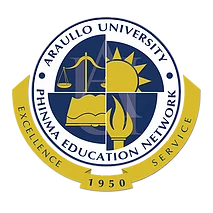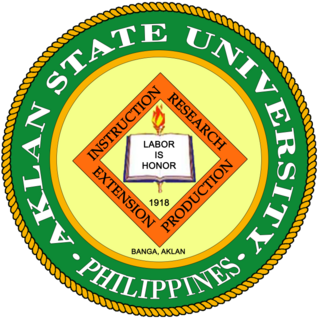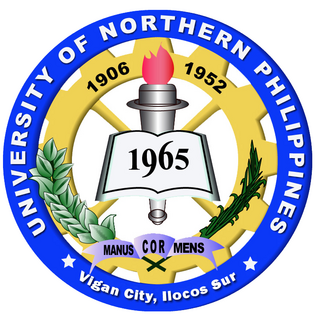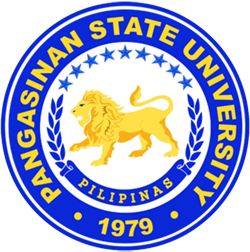
Tarlac State University is a public university located in Tarlac City, Philippines. Established in 1906, it is the flagship academic institution of higher education in the province offering different degree programs through its ten colleges and three campuses.

West Visayas State University is a public normal research university located in La Paz, Iloilo City, Western Visayas region of the Philippines. It was established in 1924 as Iloilo Normal School under the tutelage of the Thomasites, but dates back its founding in 1902 as a part of Philippine normal school system with Iloilo National High School established by the American colonial government. It later became West Visayas State College in 1965 and acquired its university status becoming West Visayas State University in 1986.

Saint Francis of Assisi College (SFAC) is a system of private, Catholic-oriented but non-sectarian Philippine educational institutions. Named after Saint Francis of Assisi, it offers complete education from pre-school up to the graduate or mistral level of education. The main campus is situated in Las Piñas, Metro Manila.

Araullo University, also referred to by its acronym "AU " or simply "Araullo", is a private, non-sectarian secondary and higher education institution in Cabanatuan, Nueva Ecija, Philippines. It was established in 1950. The university offers a wide range of secondary, undergraduate and graduate programs in its three campuses.

Aklan State University is a provincial state university in Aklan province, Philippines. Its seat of governance is in ASU - Banga, with four other campuses across the province. ASU focuses on agriculture, fishery, arts and sciences, engineering and technology, and education.

Samar State University (SSU) is a public university in the Philippines located in the province of Samar. Its main campus is located in Barangay Guindaponan, Catbalogan. The university has three other external campuses: Mercedes Campus, Catbalogan; Paranas Campus, and Basey Campus.

The Philippine Normal University is a public coeducational teacher education and research university in the Philippines. It was established in 1901 through Act No. 74 of the Philippine Commission "for the education of natives of the Islands in the science of teaching". It has campuses in Manila, North Luzon, South Luzon, Visayas, and Mindanao. Pursuant to Republic Act No. 9647, it is the country's National Center for Teacher Education.

The University of Northern Philippines is a university in Barangay Tamag, in the City of Vigan in the province of Ilocos Sur, Philippines. It is the first and oldest state university in Northern Luzon which offers low tuition fee, tracing its roots to 1906, which is older than the University of the Philippines by two years. It is the only state university in the province aimed for less-fortunate people and one of three state-owned educational institutions of higher learning operating in Ilocos Sur.

Southern Leyte State University is a public university situated in Southern Leyte, Philippines. It is mandated to provide advanced education, higher technological, professional instruction and training in trade, fishery, agriculture, forestry, science, education, commerce, engineering and related courses. It is also mandated to undertake research and extension services, and provided progressive leadership in its areas of specialization. Formerly the Southern Leyte State College of Science and Technology and Tomas Oppus Normal College, SLSU was created through the passage of Republic Act 9261 on March 7, 2004.

The Nueva Ecija University of Science and Technology (NEUST) (Filipino: Pamantasan ng Nueva Ecija sa Agham at Teknolohiya), is a state university located in the province of Nueva Ecija, Central Luzon, Philippines, with its flagship campus at Cabanatuan. The university offers graduate and undergraduate courses in many specialized fields as well as vocational training programs.

The Philippine State College of Aeronautics is a state college in the Philippines specializing in aeronautics and aviation. Its main campus is in Pasay, Metro Manila, with other campuses located across the country: Floridablanca, Pampanga; Lipa, Batangas; and Lapu-Lapu City. It is the only institution in the Philippines that offers masters programs in aeronautical education and management.

Benguet State University (BSU) is a state university in the province of Benguet, Philippines. Its main campus is in La Trinidad.

The Dr. Emilio B. Espinosa Sr. Memorial State College of Agriculture and Technology (DEBESMSCAT) is the lone state college in the province of Masbate. Its main campus is located at Cabitan, Mandaon, Masbate, while its off campus learning site is located at Cawayan, Masbate.

Pangasinan State University, also referred to by its acronym PSU or PangSU,) is a public university in Pangasinan province, Philippines. The university was founded in its current form in 1979, although its origins trace back to the 1920s. PSU is notable for its many locations throughout the province of Pangasinan. It is mandated to provide advanced instruction in the arts, agricultural and natural sciences as well as in technological and professional fields. Its main campus is located in Lingayen, Pangasinan. Other campuses are located in Alaminos, Asingan, Bayambang, Binmaley, Infanta, San Carlos City, Santa Maria, and Urdaneta City. The PSU School of Advanced Studies (SAS) is located in Urdaneta City and the Open University Systems (OUS) is located in Lingayen Campus.
Laguna State Polytechnic University is a state university in the province of Laguna, Philippines, with four regular campuses and several auxiliary sites. It is currently classified as SUC Level III.

The University of Science and Technology of Southern Philippines – Claveria Campus, formerly Misamis Oriental State College of Agriculture and Technology (MOSCAT), is a public institution of tertiary education.
Catanduanes State University (CatSU) is a research and coeducational higher education institution and a green university in Catanduanes, Philippines. It is an ISO 9001:2015 certified public university.

Davao del Norte State College is a public college in New Visayas, Panabo, Philippines, that provides instruction and progressive leadership in education, engineering, arts, sciences, fisheries, and other fields.

Guimaras State University (GSU) is a public university in the island province of Guimaras, Philippines. It is mandated to provide advance education, higher technological, professional instruction and training in the fields of education, technology, agriculture, fisheries, engineering, arts and sciences, forestry, business administration, hotel and restaurant management, tourism, health sciences, computer technology, criminology, maritime and aviation education, and other related fields of study. It consists of three campuses: the Salvador Campus, Mosqueda Campus, and Baterna Campus.

Pampanga State Agricultural University, abbreviated as PSAU, is a state-owned agricultural university, located at the western slope, of the majestic Mt. Arayat, in Magalang, Pampanga, Central Luzon, the Philippines.




































